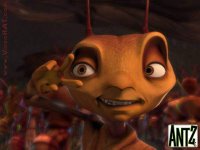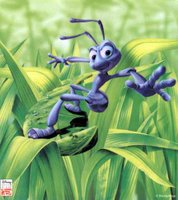So do scientists. Ponder the recent Madagascar discovery of the missing link “Dracula Ant,” which may explain how wasps evolved into ants! Marvel over the fact that ants may have internal pedometers (and boggle at the insane image of an ant with stilts attached to its legs)!
CGI animators love ants, too. But I’m less sure why.
 In A Bug’s Life, Antz, and now The Ant Bully, ants are starring figures for representing traits antithetical to ant life, as I understand it. Individualism, integrity, independence: all traits with which ants are entirely unconcerned. The triumph of the underdog may be an occasionally relevant them, when a colony is attacked by bigger, meaner ants, but basically ants just do their communal thing, not trying to stand out, to be heroes, to puzzle out the contradictions of self vs. world. Not only do they lack the “higher” brain function needed for such mental acrobatics, but their chemistry directs them along a completely oppositional path.
In A Bug’s Life, Antz, and now The Ant Bully, ants are starring figures for representing traits antithetical to ant life, as I understand it. Individualism, integrity, independence: all traits with which ants are entirely unconcerned. The triumph of the underdog may be an occasionally relevant them, when a colony is attacked by bigger, meaner ants, but basically ants just do their communal thing, not trying to stand out, to be heroes, to puzzle out the contradictions of self vs. world. Not only do they lack the “higher” brain function needed for such mental acrobatics, but their chemistry directs them along a completely oppositional path.Pupae get a hormonal bath that determines whether they’re a scout, worker, nurse, or soldier. Males aren’t produced but once a year for impregnating the queen and other fertile females who might start their own colonies if they find a good place and survive predators and beat the odds. As far as scientists have been able to determine, ants do not struggle against their biochemical destiny, do not seek to stand out but simply live, “contentedly” (yes, total anthropomorphizing there), doing what they do.
In CGI worlds, ants have individual
 personalities and names (A Bug’s Life, Antz, Ant Bully), there are lots of males everywhere (all three again), especially in positions of power other than queen, they face predators unrelated to life in the wild (A Bug’s Life’s grasshoppers were the most wacky example), and look more human than insect (too few legs in A Bug’s Life, human eyes and teeth in all three).
personalities and names (A Bug’s Life, Antz, Ant Bully), there are lots of males everywhere (all three again), especially in positions of power other than queen, they face predators unrelated to life in the wild (A Bug’s Life’s grasshoppers were the most wacky example), and look more human than insect (too few legs in A Bug’s Life, human eyes and teeth in all three).Clearly, then, CGI ant films are to be read metaphorically. Even when there is the literal (referencing ants’ ability to lift many more times than their own weight, farming aphids, etc.), they are, like most insect-centered narratives – from Aesop’s “Ant and the Grasshopper” to Caribbean Anansi tales – about human beings and human culture.
 So, why are we telling tales about ants? By “we,” now, I mean the white guys bankrolling and producing all the CGI films. They seem to be “fun” to animate, but so are cows and cars and toys. Even though I don’t understand the purpose and quirk an eyebrow at what seems an odd allusion to Aztec culture (likely also present in the original book on which the film is based), I enjoyed the beautiful tribal markings on the ants in The Ant Bully. And jokes about crossing your heart that can be made by crossing your abdomen (or “butt” as Peanut/Lucas calls it) are good for a laugh. And these films provide opportunities to sketch in lots of other insects, from ladybugs and stinkbugs to grasshoppers and wasps. But still, the question remains, why ants?
So, why are we telling tales about ants? By “we,” now, I mean the white guys bankrolling and producing all the CGI films. They seem to be “fun” to animate, but so are cows and cars and toys. Even though I don’t understand the purpose and quirk an eyebrow at what seems an odd allusion to Aztec culture (likely also present in the original book on which the film is based), I enjoyed the beautiful tribal markings on the ants in The Ant Bully. And jokes about crossing your heart that can be made by crossing your abdomen (or “butt” as Peanut/Lucas calls it) are good for a laugh. And these films provide opportunities to sketch in lots of other insects, from ladybugs and stinkbugs to grasshoppers and wasps. But still, the question remains, why ants?Well, they’re harmless and you can torture them and they keep coming back, for one. A recent documentary on masculine socialization is called “Burning Ants,” for example, referencing a common suburban boyhood experience in America that is linked to emotional distance and violent behavior in adult males. Or, as in The Ant Bully, we have the boy who takes out the pain of being bullied on “lesser” creatures who can’t fight back. So, are we into ant stories because they teach us about the importance of carrying on, regardless? Certainly, these films don’t feel to me like any kinds of insect rights narratives, where we learn to be a kinder, gentler species. But superficial anti-bully stories, sticktuitiveness tales, and underdog championing all work for the kids and families at whom these films are aimed (except Antz, which kids watch but is more adult – more metaphoric and obviously not about ants).
And we Americans do love underdog stories, even as we Americans act more like watchdog (or snarling, foaming, rabid dog) to the rest of the world.
And most of us sitting in the multiplex theater see ourselves as cogs, as peons, and long to be told that we are either (a) vital, important individuals rather than tiny dots in a vast, unfeeling universe or (b) no worse off than any other of the other 6,531,991,670 tiny human dots on the planet (as of 1 August 2006, 2:34pm CST). CGI ant movies can help us with this, I guess, without risking encouragement of a challenge to the cultural status quo – though ants should challenge us with their differences, if only we’re open to seeing them.
In addition, there is the communalism. There is much in ant life that might be deemed threatening to human cultures, especially western, first-world nations like the U.S. of A. We are scared of some forms of communalism, like communism, in which we see threats to individual life choices, to the mythic American Dream. Our choices may be trivial (what brand of dog food to feed the pooch) or significant (abortion or no abortion); and we may envision others as foregoing choice for mindless obedience (e.g. Fundamentalist Muslims), while we actively restrict our choices for wise adherence to a greater truth (e.g. Fundamentalist Christians).
These CGI ant movies definitely do reflect our obsession with the tension between community and self, standing out and fitting in, insider and outsider, what we owe others and what we owe ourselves. And they firmly acknowledge the needs of social creatures (like ants and humans) while validating the importance of individual acts of genius, bravery, and creativity, especially in service of the culture/State (less ant, more human). We obsess about this stuff and find few answers that content us as we face love, loss, illness, death, war, poverty, and a host of other messy aspects of human life. Ultimately, ant stories seem to reflect these necessary obsessions, whether they’re created as childish diversions or philosophical treatises in harmless entertainment guise.
What can we conclude from this? Perhaps that we fashion these ant narratives to process, superficially, our collective angst as American homo sapiens at the turn of the millennium. We really don’t understand how ants can be “happy” and this bothers us, largely because we don’t know how to be happy. Instead, we use this truly alien species to reassure ourselves that differences don’t really matter, that our myths and platitudes (such as the underdog can win and bullies can be scared off with a little teamwork) truly satisfy us. CGI ant movies tell us nothing about what it would mean to be an ant, if they were sentient; they indoctrinate children to see difference and reduce it to the known and the manageable; and they reassure adults that nothing is truly alien and all is as it should be. What a small, scared little species we are.


1 comment:
Lovely social commentary. Yes, whenever I have the time and mental energy I review your elucidations. The ants discourse which this is a comment to, was interesting. It is very true that being a dominant species the smaller, but more prolific species are often treated as toys for our amusment. This makes for much to say about our society and us as humans in general.
Community, common bonds and in general communality is of great interest to me and I appreciate you offering such insights from current cinema
Post a Comment